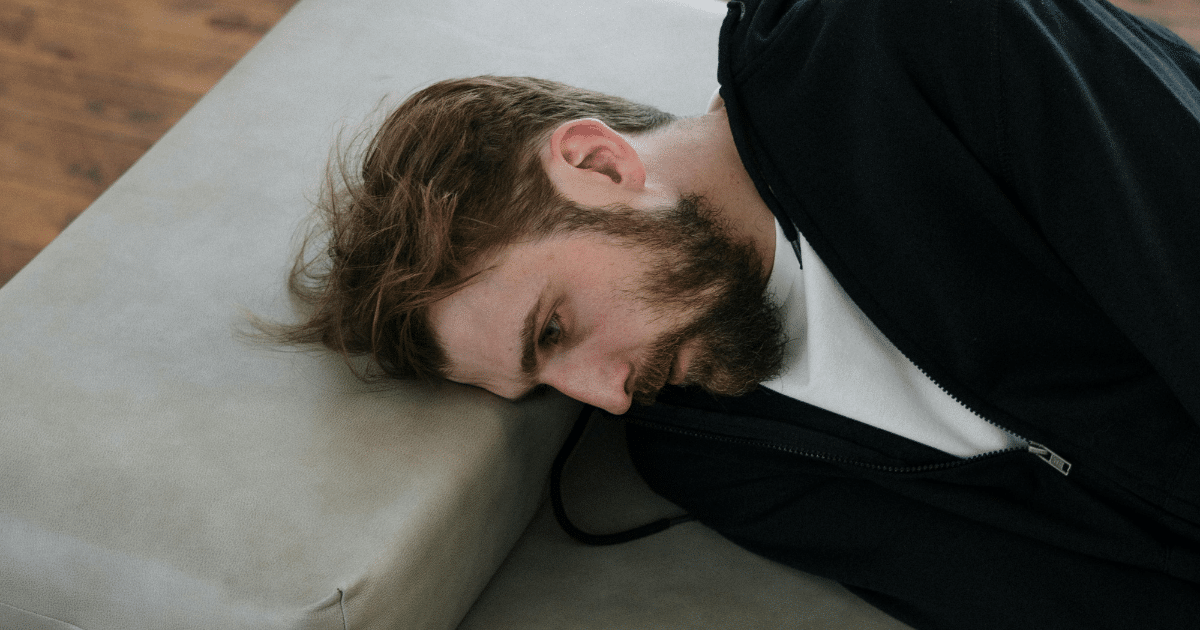Thousands of people turn to NyQuil as their primary choice for counter-medication treatment of cold and flu symptoms. Adults who struggle to sleep with congestion by taking doxylamine, dextromethorphan, and alcohol-based NyQuil experience sedation that helps them rest during their illness. Excessive use of NyQuil for sleep or psychological relief purposes could result in addictive behavior patterns.
Studies conducted by the National Institute on Drug Abuse discovered that over 3.1 million individuals from the U.S. population aged 12 or older misused cough and cold medicines in the previous year, leading them into habitual use patterns despite NyQuil not being classified as a controlled substance. Its components demonstrate addictive qualities when misused often. Most individuals fail to understand that nightly NyQuil consumption for sleep indicates potential hidden problems that become more concerning when use persists beyond symptom-free cold remission.
This blog dives into an important and often overlooked question: Can you get addicted to NyQuil? We’ll break down the signs of NyQuil dependence, explore the risks of over-the-counter medication misuse, and guide you through safe ways to manage sleep or cold symptoms without putting your health at risk.
What Is NyQuil and How Does It Work?
NyQuil is one of the leading prescription-free medicine products (OTC) used for cold and flu relief during nighttime hours to treat congestion, coughing, sore throat and headache along with fever symptoms and inability to sleep. Over-the-counter NyQuil gets widespread use because of its sedative properties that allow sick patients to get restful sleep during recovery. The sedative impact of this medicine can develop into drug addiction whenever users use it excessively for extended periods.
Silicon Valley Recovery Center
Active Ingredients Explained
Several active ingredients comprise NyQuil, which targets various symptoms. Here is an explanation of the contents in NyQui, together with their operational mechanisms:
| Ingredient | Purpose | Effect on the Body | Addiction Risk |
| Dextromethorphan | Cough suppressant | Blocks the cough reflex in the brain | High |
| Doxylamine succinate | Antihistamine & sedative | Causes drowsiness, dries up the nasal passages | Moderate |
| Acetaminophen | Pain reliever & fever reducer | Reduces pain and fever by blocking certain chemicals | Low |
| Alcohol | Solvent & enhances the sedative effect | Increases drowsiness and can intensify intoxication | High |
Intended Medical Use
NyQuil is designed for temporary relief of cold and flu symptoms, including:
- Cough
- Runny nose
- Sneezing
- Headache
- Minor aches and pains
- Fever
- Sore throat
- Nighttime restlessness due to illness
The manufacturer designed NyQuil to provide temporary relief, and it should not be used continuously as a sleeping medication. The manufacturer recommends a limited period of use for NyQuil, which should not exceed 7 days except in cases where a healthcare provider gives different instructions.
Making brief use of NyQuil enables the body to rest and recover. NyQuil becomes a dangerous activity if used beyond its prescribed limits as approved by the manufacturer.
Common Myths About NyQuil Use
Most people believe NyQuil, along with other similar over-the-counter drugs, are risk-free because they do not need a prescription to purchase them. People hold a false belief about these medicines, leading them to misuse the drugs and develop dependencies. These are the most frequently circulated myths about NyQuil consumption:
Myth 1: You Can’t Get Addicted to NyQuil Because It’s OTC
Reality: The fact that NyQuil is sold without requiring a prescription does not indicate complete safety for users. The two main ingredients of NyQuil (dextromethorphan and doxylamine succinate) can lead to addictive behaviors if people take that amount or swallow NyQuil for sleep repeatedly. The use of NyQuil as a sleep aid without a prescription can develop into a warning sign that indicates psychological dependence.
Myth 2: NyQuil is a Safe Long-Term Sleep Aid
Reality: The manufacturers made NyQuil for short-term use only throughout the day. Using NyQuil to manage sleep at night is a wrong use of the medication, regardless of whether you are sick with a cold or flu. The regular intake of NyQuil medicine increases a person’s risk of developing tolerance, followed by higher dosage requirements that ultimately result in dependencies focused on the sedative effects.
Myth 3: Only Teens Abuse NyQuil or Cold Medicine
Reality: Adults display equal opportunities as teenagers to misuse NyQuil medications because they seek these drugs to manage stress alongside anxiety and insomnia. Dependency doesn’t discriminate by age. The continued use of NyQuil outside of medical needs leads people to dangerous health risks, which stem from habitual misuse of cold medications.
Signs and Symptoms of NyQuil Dependency
A dependency on NyQuil typically builds up slowly until people cannot detect its progress. Your body starts to depend on NyQuil use after you use it for occasional cold relief or as a sleep aid throughout the night. Recovering from addiction starts by noticing early symptoms before misuse or addiction becomes established. You need to check your relationship with OTC medications if you observe any abnormal physical reactions or behavioral changes.
- Using NyQuil even when you’re not sick, especially to fall asleep or relax
- Increasing the dosage over time to get the same effect (tolerance)
- Relying on NyQuil nightly as a sleep aid
- Experiencing withdrawal symptoms like irritability, anxiety, insomnia, or headaches when stopping use
- Feeling guilty, ashamed, or secretive about how often you use NyQuil
Struggling with focus, productivity, or daily responsibilities due to lingering sedative effects - Mixing NyQuil with alcohol or other substances to enhance its effects

Factors That Lead to NyQuil Misuse
NyQuil misuse often begins innocently. A large number of users start their experience with correct usage by following recommended dosage instructions to treat symptoms of colds and flu. People tend to break the correct use of NyQuil when they start to view it as a simple tool for relaxation and sleep rather than its intended purpose.
The following list includes the main reasons that lead people to misuse NyQuil:
| Factor | How It Contributes to Misuse |
| Chronic Sleep Issues | Using NyQuil as a nightly sleep aid rather than addressing underlying sleep problems |
| Stress or Anxiety | Turning to NyQuil to “shut off the mind” instead of seeking healthy coping mechanisms |
| Easy Accessibility | Being an OTC medication, it’s easy to purchase without scrutiny or restrictions |
| Lack of Awareness | Many users don’t realize it contains sedating and potentially addictive ingredients |
| Past Substance Use | Individuals with a history of substance misuse may be more prone to relying on NyQuil |
| Teen Experimentation | Adolescents may use NyQuil recreationally due to its intoxicating effects in high doses |
| Self-Medication | Using NyQuil to manage emotional pain or mental health issues instead of seeking proper support |
Silicon Valley Recovery Center
How NyQuil Misuse Affects Your Body and Mind
Using NyQuil outside of its intended medical purpose can take a toll on both physical and mental health. Some of the effects may be subtle at first, but long-term misuse can lead to serious consequences:
- Liver damage from excessive acetaminophen intake
- Cognitive fog, drowsiness, and difficulty concentrating during the day
- Mood swings, increased anxiety, or depression from disrupted brain chemistry
- Tolerance and dependency, requiring larger doses to feel the same effects
- Withdrawal symptoms like insomnia, irritability, and agitation when trying to stop
- Increased risk of overdose, especially when combined with alcohol or other sedatives
Safe Guidelines for Using NyQuil Responsibly
The proper use of NyQuil leads to both safety and effectiveness in medicinal treatment. These essential guidelines will help users maintain proper use of NyQuil:
- Follow the dosing instructions on the label and do not exceed the recommended amount
- Only use NyQuil when experiencing cold or flu symptoms – not as a sleep aid or for stress relief
- Limit use to a few days (generally no more than 7) unless advised otherwise by a healthcare provider
- Avoid combining NyQuil with alcohol or other sedating substances
- Do not use NyQuil as a substitute for mental health or sleep treatments
- Talk to a doctor if you feel the urge to use NyQuil regularly or if you’re experiencing side effects
Seek Help at Silicon Valley Recovery Today
Many people and their loved ones face NyQuil dependence challenges, yet there exists sufficient support for this condition. Silicon Valley Recovery supports the specific recovery needs of patients who misuse OTC medications.
Your recovery process must not wait until the situation has deteriorated more. Contact Silicon Valley Recovery at this moment to start your journey toward a healthier balanced life. Your recovery journey is of utmost importance because we provide ongoing support at every phase.
Contact us now to speak with a specialist and learn more about your options.

FAQs
Can you become addicted to over-the-counter medications like NyQuil?
Yes, you can. NyQuil is available without a prescription, but its main ingredients, dextromethorphan and doxylamine, may develop into habit-forming substances when used excessively or in high amounts.
What are the long-term effects of using NyQuil regularly?
Regular use of NyQuil can lead to the following health concerns:
- Liver damage
- Increased tolerance
- Dependency
- Cognitive impairments
- Anxiety or depression.
- Insomnia
How is NyQuil addiction treated?
The treatment of NyQuil addiction requires a medical detoxification process followed by behavior therapy with support services.
Is it dangerous to mix NyQuil with other substances?
Absolutely! The combination of NyQuil with alcohol alongside prescription sedatives or other drugs produces severe consequences for the user. Combined use of NyQuil with alcohol and sedatives escalates the dangers of respiratory suppression, drug overdose, hepatic damage, and motor control impairment.
Silicon Valley Recovery Center
How can I tell if someone I know is misusing NyQuil?
The misuse of NyQuil becomes evident through continued consumption when healthy and secretiveness about use combined with alterations in mood or daytime drowsiness and defensiveness upon enquiries. Open discussions should occur when you observe such behavioral patterns, so they can get the necessary professional support.


